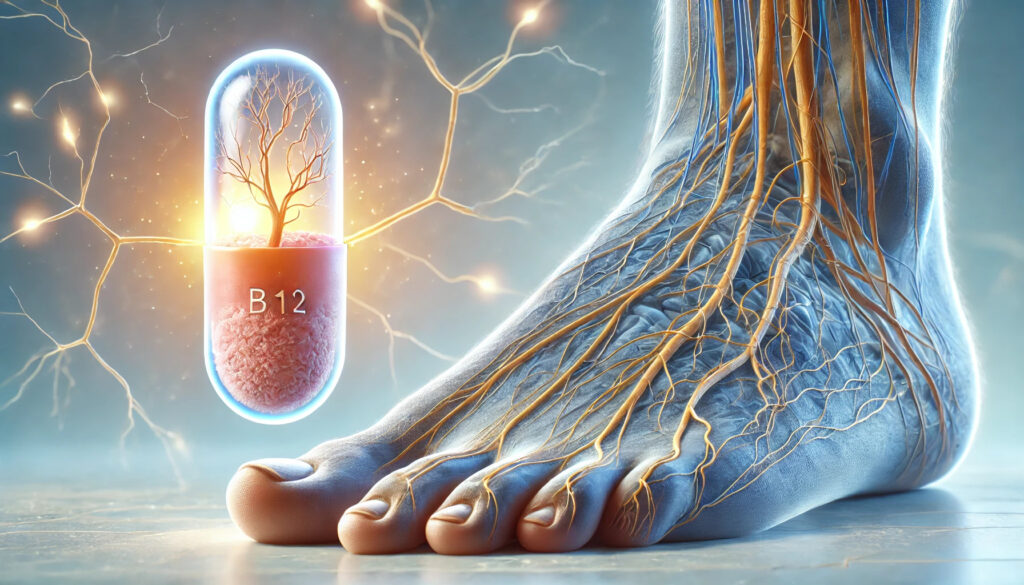
Vitamin B12 is crucial for maintaining the health of nerve cells and plays a vital role in the formation of myelin, the protective sheath that surrounds nerves and facilitates the efficient transmission of electrical impulses between nerve cells. Here’s a detailed look at how Vitamin B12 supports nerve health, particularly in the context of preventing or managing neuropathy:
- Myelin Formation: Vitamin B12 is essential for the synthesis of myelin. Myelin not only insulates and protects nerve fibers but also speeds up the transmission of electrical signals along nerve cells. Without sufficient B12, myelin is produced less efficiently, which can lead to slower nerve signal transmission and the symptoms associated with neuropathy.
- Nerve Regeneration: There is evidence that vitamin B12 promotes nerve regeneration. It aids in the repair of damaged nerve cells and can contribute to the restoration of nerve function over time. This aspect is particularly important in conditions like peripheral neuropathy, where nerve damage is prevalent.
- Neurotransmitter Function: Vitamin B12 is involved in the synthesis of neurotransmitters, which are chemicals that transmit signals from one nerve cell to another. Proper neurotransmitter function is essential for the normal functioning of the nervous system.
- Homocysteine Metabolism: Vitamin B12 plays a key role in the metabolism of homocysteine, an amino acid that, at high levels, is associated with nerve damage and various negative health effects, including cardiovascular diseases. By helping to keep homocysteine levels low, B12 indirectly protects nerves from potential damage linked to elevated homocysteine levels.
Deficiency in vitamin B12 can lead to significant nerve damage, sometimes irreversible, if not addressed timely. Symptoms of B12 deficiency include numbness, pins and needles sensations, reduced ability to feel vibrations, muscle weakness, and problems with walking and balance. This deficiency is often found in older adults, vegetarians, or those with absorption issues related to the digestive tract.
For individuals dealing with neuropathy, especially in diabetes, supplementation of vitamin B12—after proper medical consultation—can help manage the condition and potentially alleviate symptoms. Vitamin B12 is available in several forms, including tablets, capsules, and injections, with the latter often used in cases of severe deficiency or malabsorption.
Does vitamin B12 come in various forms?
The main forms of vitamin B12 you might encounter include:
- Cyanocobalamin: This is a synthetic form of vitamin B12 that is most commonly used in supplements and fortified foods. Cyanocobalamin is stable and cost-effective, making it a popular choice. Once ingested, it is converted in the body to the active forms of vitamin B12 (methylcobalamin and adenosylcobalamin).
- Methylcobalamin: This is a naturally occurring form of vitamin B12 and one of the two active forms that can be directly utilized by the body. Methylcobalamin is particularly important for brain and nerve health and is often used in supplements intended to support the nervous system.
- Hydroxocobalamin: This form is naturally produced by bacteria and is commonly used in prescription injections to treat vitamin B12 deficiency. Hydroxocobalamin is retained in the body longer than other forms, making it effective for restoring vitamin B12 levels.
- Adenosylcobalamin: The other active form of vitamin B12, adenosylcobalamin, is less commonly found in dietary supplements but is crucial for energy metabolism and maintaining the health of nerve cells.
Each form has its specific applications and benefits. For example, methylcobalamin and adenosylcobalamin are preferred for neurological health due to their active roles in nerve function. Cyanocobalamin, due to its stability and cost-effectiveness, is widely used in oral supplements and food fortification. Hydroxocobalamin is especially useful in injectable forms for treating deficiencies because of its prolonged activity in the body.
When choosing a vitamin B12 supplement, it’s important to consider the specific needs of your body and any medical advice you have received, as some forms may be more effective for certain conditions than others.
What are some delivery options for vitamin B12?
Vitamin B12 supplements are available with several delivery options besides pills. These include:
- Tablets and Capsules: These are the most common forms of vitamin B12 supplements, taken orally.
- Sublingual Lozenges or Tablets: These are placed under the tongue and dissolve slowly, allowing vitamin B12 to be absorbed directly into the bloodstream through the mucous membranes in the mouth.
- Nasal Gels: These are applied inside the nose and are another alternative for those who may have trouble with oral supplements.
- Patches: B12 patches are worn on the skin and supposed to deliver vitamin B12 transdermally, although their effectiveness can vary.
- Injections: Vitamin B12 injections are a very common method to treat significant deficiencies or malabsorption issues. These are typically given as hydroxocobalamin or cyanocobalamin.
- Infusions: Vitamin B12 infusions involve delivering high doses of the vitamin directly into the bloodstream through an IV. This method is usually reserved for cases where rapid correction of deficiency is needed, or where gastrointestinal absorption is impaired. Infusions must be administered under medical supervision, usually in a clinical setting.
Each form of B12 has specific use cases, advantages, and limitations. Injections and infusions, for instance, bypass the digestive system and are useful in patients with absorption problems, such as those with pernicious anemia or gastrointestinal surgeries that affect nutrient uptake. Oral forms are generally sufficient for most people, but those with particular health issues may require more direct forms of supplementation. Always consult healthcare professionals to choose the most appropriate form and dosage of vitamin B12 that meets individual health needs.
Has vitamin B12 been involved in reported fatalities or severe reactions?
Vitamin B12 is generally considered very safe, even at high doses, because it is a water-soluble vitamin and any excess is usually excreted through urine. Severe reactions or fatalities from vitamin B12 supplementation itself are extremely rare.
However, there are some potential issues and minor side effects that can occur, especially with certain forms of administration:
- Injection Reactions: The most common side effects are at the injection site, including pain, redness, and swelling. In rare cases, some people might experience an allergic reaction to the preservative or the cobalt component in B12, especially with the cyanocobalamin form.
- Mild Side Effects: Oral forms of B12 can sometimes cause diarrhea, itching, or rash.
- Drug Interactions: Vitamin B12 can interact with certain medications, such as proton pump inhibitors (PPIs), metformin, and certain antibiotics, potentially leading to decreased absorption of the vitamin.
- Underlying Health Issues: People with certain health conditions, such as Leber’s disease (a hereditary eye disease), should avoid vitamin B12 supplements, as they can worsen the condition.
Despite these potential issues, serious complications are very uncommon. For the vast majority of people, vitamin B12 supplements are a safe and effective way to correct or prevent deficiency. As with any supplement, it is best to consult with a healthcare provider before starting, particularly if you have underlying health conditions or are taking other medications.
What are some other FAQs about vitamin B12?
Here are other FAQs focusing on the role of vitamin B12 and neuropathy.
- How does vitamin B12 deficiency contribute to neuropathy?
Vitamin B12 deficiency can lead to nerve damage by affecting the formation of myelin, the protective coating around nerves, and by reducing the ability of nerves to transmit signals effectively, which can manifest as symptoms of neuropathy. - What are the signs of B12 deficiency in people with neuropathy?
Common signs include increased numbness and tingling in the hands and feet, muscle weakness, difficulties with balance, and, in severe cases, cognitive disturbances like memory loss and confusion. - Can vitamin B12 supplements reverse neuropathy symptoms?
If neuropathy is directly related to vitamin B12 deficiency, then supplementing can improve symptoms and, in some cases, reverse nerve damage. However, the effectiveness depends on how early the deficiency is treated. - Are there specific types of vitamin B12 that are better for neuropathy?
Methylcobalamin is often recommended for neuropathy because it is the active form that is readily utilized by nerve cells and has shown potential benefits in nerve regeneration and function. - How much vitamin B12 should someone with neuropathy take?
Dosage can vary widely depending on the severity of the deficiency and the individual’s condition. Healthcare providers might prescribe high-dose supplements or injections to quickly restore adequate levels. It’s crucial to follow a healthcare provider’s guidance. - Can vitamin B12 be used alongside other treatments for neuropathy?
Yes, vitamin B12 supplements can be used in conjunction with other medications and therapies prescribed for neuropathy, such as pain relievers, anti-seizure medications, or physical therapy. Discuss any new supplements with your healthcare provider to avoid interactions. - How quickly can I expect to see improvements in my neuropathy symptoms with B12 treatment?
Some people notice improvements in symptoms like pain and tingling within a few weeks of starting B12 treatment, but it may take several months for others, particularly if the nerve damage has been severe or longstanding. - Are there any side effects of taking vitamin B12 for neuropathy?
Vitamin B12 is generally considered safe with few side effects. However, some people might experience mild side effects such as diarrhea or itching, especially at high doses. - Should I monitor my vitamin B12 levels regularly if I have neuropathy
Monitoring levels can be helpful to ensure they are within a therapeutic range, especially if you are taking supplements to correct a deficiency. Regular monitoring can also help adjust dosages as needed under the supervision of a healthcare provider.
These FAQs might interest the specific concerns and needs of individuals dealing with neuropathy, They highlight how vitamin B12 plays a critical role in managing and potentially improving their condition.
Severe Vitamin B12 Deficiency Symptoms
- Could You Have Vitamin B12 Deficiency?
Vitamin B12 deficiency can cause symptoms like pale skin, fatigue, weakness, cognitive changes, loss of appetite, and more. - Why Vitamin B12 Is Essential for Lifting Your Mood and Energy
Having low levels of B12 could lead to a lack of energy, depressed feelings, anxiety, shortness of breath, and tingling hands and feet. - I had muscle twitches in 3 areas of my body and blamed dehydration – but it was a severe B12 deficiency
Vitamin B12 deficiency can cause a wave of symptoms, but like other conditions, they can be vague and hard to pinpoint. For months, Angelica Cassidy was plagued with spasms in different parts of her body before she was eventually diagnosed with the condition. - How vitamin B12 deficiency can affect adults dangerously
Vitamin B12 is crucial for red blood cell formation, DNA synthesis, and neurological health. Its deficiency can lead to severe consequences like chronic pain, neurological damage, and increased risk of dementia. Factors such as poor diet, certain medical conditions, and medication use can affect B12 absorption. Symptoms include fatigue, memory problems, and depression, making early detection essential. - To B12, or Not to B12? Vitamin B12 and mental health.
Recently, the potential emotional benefits of vitamin B12, a crucial nutrient for overall health and neurological function, have also received scrutiny. Severe B12 deficiency can, in some cases, cause serious neurological and psychiatric symptoms, but what about milder deficiencies? Can low B12 levels contribute to common mental health struggles like depression or anxiety? - 9 Signs You’re Not Getting Enough B12
As you age, your body’s ability to absorb vitamin B12 from food slows—4 out of every 100 women ages 40 to 59 are B12 deficient, and many more are borderline. But celebrating another birthday isn’t the only cause.
